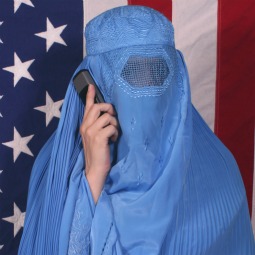Islam and America
Ten years after al Qaeda attacks, United States still “wrestling” with the religion of the 9/11 terrorists.

WASHINGTON — “America is wrestling with Islam, and Islam is wrestling with America.”
So says William Galston, a senior fellow at the Brookings Institution, at a panel convened last week to discuss a new survey of U.S. attitudes on Islam, religious values, immigration and racial discrimination.
The survey found that 10 years after the Sept. 11 attacks Americans are evenly divided on the question of whether the values of Islam are compatible or at odds with American values and culture.
Among the findings: the majority of American Catholics surveyed do not find Islam and American values at variance, while 6 in 10 white, evangelical Protestants do.
But some findings indicated less ease with Muslims: Nearly a third — 30% — of those surveyed said that American Muslims want to establish sharia (Islamic law) in the United States.
The survey was conducted for the Public Religion Research Institute. PRRI and Brookings teamed up to produce a joint report based on its findings, What It Means to Be American: Attitudes in an Increasingly Diverse America Ten Years After 9/11.
On the question of Islam’s compatibility with American values, 47% said it is compatible, while 48% rejected that notion.
Catholic scholar Robert Royal, president of the Faith and Reason Institute, was not present for the Brookings Institute panel discussion. But, contacted later, he observed that, “If American values mean respect for pluralism, democracy, and individualism, as these terms are used in the West,” some adjustments might be required of Muslims to become fully compatible with those values.
Approximately two-thirds of Republicans, respondents sympathetic to the Tea Party movement and Americans who most trust Fox News as their primary source of news believe that Islam is incompatible with American values.
A majority of Democrats, independents, and those who most trust CNN or public television, however, see no problem with Islam and American values.
Sharia
One of the most intriguing questions was whether respondents believe American Muslims want to establish sharia in the U.S. While the overwhelming majority — 61% — do not think this is the case, the percentage of people who do is growing. Eight months ago, only 23% felt that American Muslims seek to bring sharia to the U.S. Now it is 30%.
“The year 2011 was an enormously active year on this question,” said Robert Jones, CEO and founder of PRRI.
Muqtedar Khan, a sociology professor at Georgetown University, who said that reading the survey was like being “on an emotional rollercoaster,” appeared distressed by the sharia issue.
“Sharia is just a prop to say ‘We don’t like Islam,’” he said.
Royal, of the Faith and Reason Institute, disagreed with Muqtedar. “Are there Muslims who don’t intend to spread sharia? Yes. Are there Muslims who do? Yes. There are Muslim groups who believe in the incremental approach, gradually taking over a portion of the West by non-violent means by the spread of sharia.”
Brookings’ Galston compared today’s negative attitudes towards Muslims to similar attitudes towards Catholics, then the newcomers to American society, in the late 19th century. Galston said that American Catholics recognized that there was prejudice and made greater efforts to assimilate. Galston added that the United States is “committed at its core” to religious tolerance and that this value is “tested by successive waves of new religions.”
Immigration
Still, a majority of Americans (54%) do agree that Muslims are an important part of the country’s religious community. Forty-three percent disagree. Eight in 10 Americans think that Muslims in other countries have an unfavorable opinion of the U.S., and two-thirds of Americans say that this attitude is not justified.
Interestingly, Americans have a double standard when it comes to violence committed by self-identified Christians and Muslims — more than 8 in 10 said that when self-identified Christians commit violent acts they have no right to call themselves Christians. Less than half (48%) say that violent Muslims have no right to call themselves Muslims.
Another important facet of the survey, especially for political-policy decisions, concerned American attitudes on immigration. Americans prefer a comprehensive approach with a path to citizenship over an enforcement-only policy by a large margin (62% to 36%). But the breakdown is telling. Nearly three-quarters of Democrats and more than 6 in 10 independents support securing the borders coupled with an earned path to citizenship. Republicans are evenly split. Six in ten Americans who identify with the Tea Party favor securing the borders and deportation of those here illegally.
There was strong support (57% to 40%) for the Dream Act that allows young people brought here illegally to become citizens by enrolling in college or serving in the military.
“There is an interesting tension revealed in the survey.” A majority think that there should be generous, far-reaching immigration reform, but there is an intense minority that opposes generous immigration reform. In American politics, intensity often wins over numbers, and there is intensity against generous reform.
The summary of the survey suggests that Americans are in the midst of a struggle over what it means to be an American and the meaning of racial and religious diversity.
Columnist and Brookings senior fellow E.J. Dionne, who worked on the joint report, said that 9/11 had “aggravated” the divisions in American society. But he noted that the embrace of new citizens and religions has been a constant in American history.
“We have always in the end managed to bend towards inclusion,” Dionne said. “But we have always struggled with this.”
Charlotte Hays writes from Washington, D.C.













